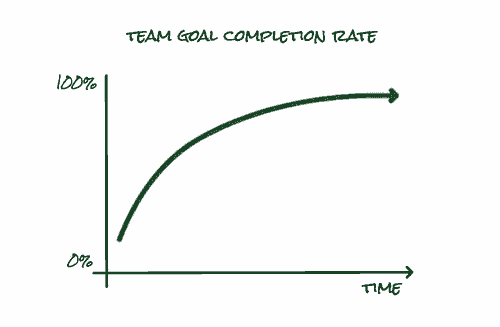Ever been way off on a software delivery estimate? Wished you could more accurately predict when a project or feature would be ready to ship? Of course you have.
Most thrashing and trouble that I’ve witnessed in software — that isn’t design or experience related — is the result of missed timelines or misguided project scope. If you’ve managed a software team for any length of time, you’ve experienced it. Executives breathing down our backs, lost weekends, post-mortems, and uncomfortable retros.
So what can we do to make it happen less?
Here at Status Hero, we’re big fans of setting daily goals. They help team members focus on what’s important. They make it easy to decide where to invest time. And they help everyone estimate delivery dates better.
Goals vs. Tasks
People confuse goals and tasks sometimes, so let’s distinguish between the two. Goals represent meaningful and impactful pieces of work. Goals lead to real change. They’re aspirational. Tasks, on the other hand, are mechanics and tactics. Tasks are the smaller chores that may — or may not — move you toward your goal. On their own, tasks provide little to no value.
An example of a goal is adding the ability for users to attach files to their check-ins. A task related to that goal might be meeting with the PM to review the user story. Having the meeting alone is not valuable. Shipping the feature to customers is the real objective.
So why track goals and not tasks? You may have a goal that’s comprised of several tasks, but completing the goal is really all that matters. By setting goals each day, you hold yourself accountable for achieving something meaningful. It prevents “snacking” on tasks that may look substantial on a to-do list, but don’t actually deliver value.
How Do Goals Help Estimates?
Once your team starts setting daily goals, they’ll learn what’s actually achievable in a single workday. They’ll get better at estimating work, which will lead to a stronger grasp of your team’s overall velocity. Plus, people like meeting goals and checking them off as met. It’s strong incentive to get stuff done.
And when your team is better at estimation and has a more predictable velocity, your job of scoping and planning projects suddenly becomes easier — and you’re vastly better at it. If you manage software teams, you know this is critical for your success.
At Status Hero, we’ve seen people make big leaps in their estimating skills in just 3–4 weeks.
Better Communication
Daily goals also help us understand what’s really going on with a team. Everyone can better gauge the actual progress being made. Instead of having to figure out, guess, or assume what a list of tasks or JIRA items amount to, you and your team get the big picture, in an easy-to-understand and succinct way. Improved and streamlined communication makes it easier to identify blockers too. You’ll be better equipped to recognize when something — or someone — needs your attention, and removing blockers will keep your team moving forward on schedule.
Setting and achieving daily goals will also make your team feel more productive. They’ll be excited to share their completed goals from the previous day at stand-up. You can celebrate small wins together, even connect over the misses, and that creates a positive reinforcement loop that keeps people communicating.
Get Started Today
So if you’re tired of missing deadlines, if you struggle to understand how your team is actually doing, start tracking and measuring daily goals instead of focusing on tasks. You’ll quickly see that your team is providing more accurate estimates, saving you time and hassle. And if you’re looking for a tool to help you, Status Hero has you covered.

